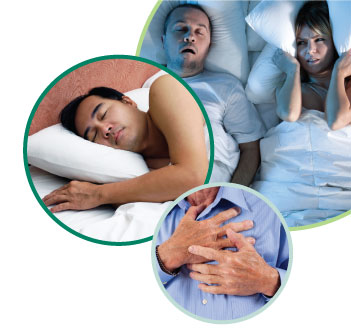|
 Health Problems Associated to Sleep Apnea Health Problems Associated to Sleep Apnea
What You Need to Know About TMD/Orofacial Pain and Sleep Disorders
The National Institutes of Health (NIH) statistically related TMD/orofacial pain and disordered breathing during sleep (snoring) with heart attack, stroke, high blood pressure and high cholesterol. The American Academy of Sleep Medicine has estimated up to 33% of the general population has some type of sleep disorder. Dental pathology and sleep disorders are the most common causes of orofacial pain. Face, neck, shoulder, eye, ear, jaw pain and headache are often the chief complaints of TMD/orofacial pain.
What Causes Snoring
Upon falling asleep, muscles of the throat, jaw and tongue naturally relax and the collapse of the throat may occur. The majority of snoring is caused by the collapse of the throat resulting in restricted airflow. The vibrational sound of snoring occurs as the air has to be forced through the relaxed/collapsed soft tissues of the throat.
Sleep Apnea
Snoring may progress to Obstructive Sleep Apnea (OSA) with episodes of total and/or significant reduction of airflow during sleep. Episodes of lowered blood oxygen, rapid heart rate (tachycardia), and high blood pressure are common. During sleep, the brain needs more oxygen for the production of growth hormone, pain inhibitors and to direct the restoration of the body from every day wear and tear. With the tongue, jaw and throat muscles relaxed temporarily blocking the throat; the individual will arouse to breathe. With each arousal, blood pressure and heart rate may increase. Sleep Apnea may cause severely disturbed sleep with potentially hundreds of arousals per night. The individual often is not aware of these arousals, however; the result is the loss of restorative sleep, excessive daytime sleepiness, inability to focus, increased car accidents and NIH related pain and cardiovascular problems.
With a diagnosis of sleep apnea, a sleep physician will often prescribe a mandibular advancement device (MAD) or a CPAP machine. Unfortunately, many patients are intolerant of CPAPs and refuse to wear them. The AASM considers the CPAP and MAD as appropriate and highly effective treatments for the control of OSA.
Health Risks Associated with Untreated Sleep Apnea
- #1 Cause of Death During Sleep
- Increased Risk of Heart Attack
- Increased Diabetes Type II
- Increased Risk of Stroke
- Increased GERD (Gastro Esophogeal Reflux Disease), Acid Reflux
- Increased Risk of Arrhythmias
- Increased Risk of Carotoid Artery Plaque Formation
- Increased Risk of Personal Accidents (Falling or Tripping)
- Headaches, TMJ and Bruxism
- Fibromyalgia
- Excessive Daytime Sleepiness (2nd Leading Cause of Motor Vehicle Accidents)
- Memory Impairment
- Personality Changes
- Performance Impairment
|
|
